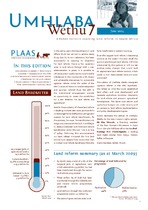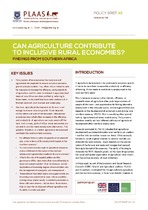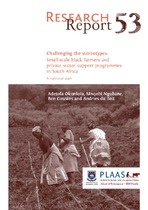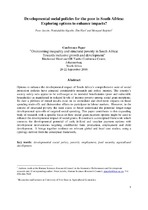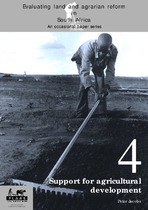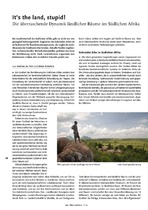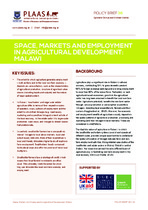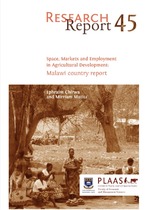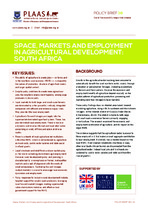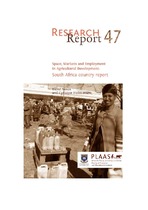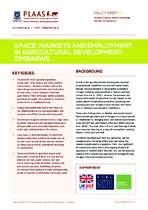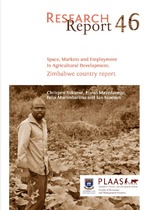Browsing Faculty of Economic and Management Sciences by Subject "Agricultural development"
Now showing items 1-12 of 12
-
ANC election manifesto in relation to rural development and land reform
(PLAAS, 2009-06)In the last 15 years the Department of Land Affairs (DLA) has set out to achieve many things but, by its own admission, has been unsuccessful in meeting its objectives for land reform. Hence a few questions arise. Is land ... -
Can agriculture contribute to inclusive rural economies?
(Institute for Poverty, Land and Agrarian Studies, University of the Western Cape, 2015)If agricultural development is to contribute to economic growth, it has to do more than increase the productivity or efficiency of farming. It also needs to contribute to employment in the rural non-farm sector. This ... -
Challenging the stereotypes: small-scale black farmers and private sector support programmes in South Africa
(Institute for Poverty, Land and Agrarian Studies (PLAAS), University of the Western Cape, 2016)This report represents one of the outputs of a research and social dialogue project undertaken over 18 months. It explores a number of private sector partnerships and projects launched in support of black farmers – some ... -
Developmental social policies for the poor in South Africa: Exploring options to enhance impacts?
(Institute for Poverty Land and Agrarian Studies (PLAAS), 2010)Options to enhance the developmental impact of South Africa’s comprehensive suite of social protection policies have attracted considerable research and policy interest. The country’s society safety nets appear to be ... -
Evaluating land and agrarian reform in South Africa : Support for agricultural development
(Institute for Poverty Land and Agrarian Studies (PLAAS), 2003)In South Africa, land reform has to be more than securing land rights and transferring a certain number of hectares to black people. Broadly speaking, it has to take into account the uneven spatial development patterns ... -
Space, markets and employment in agricultural development: Malawi
(Institute for Poverty, Land and Agrarian Studies, University of the Western Cape, 2015)Agriculture plays a significant role in Malawi’s national economy, contributing 35% to gross domestic product, 90% to foreign exchange earnings and providing employment to more than 80% of the labour force. Particularly ... -
Space, markets and employment in agricultural development: Malawi country report
(Institute for Poverty, Land and Agrarian Studies, University of the Western Cape, 2015)There is a growing literature on the links between farm and non-farm employment activities in rural societies and the important roles played by rural non-farm employment in poverty reduction (Lanjouw, 2001; Davis et al., ... -
Space, markets and employment in agricultural development: South Africa
(Institute for Poverty, Land and Agrarian Studies, University of the Western Cape, 2015)Growth in the agricultural sector has long been assumed to automatically benefit the rural non-farm sector, mainly through production or consumption ‘linkages’, including expenditure by farmers and their workers. However ... -
Space, markets and employment in agricultural development: South Africa country report
(Institute for Poverty, Land and Agrarian Studies, University of the Western Cape, 2015)Throughout much of the developing world, including sub-Saharan Africa, agriculture is frequently viewed as central to efforts to foster development and reduce poverty. Key conceptual and policy issues accordingly raised ... -
Space, markets and employment in agricultural development: Zimbabwe
(Institute for Poverty, Land and Agrarian Studies, University of the Western Cape, 2015)Growth in the agricultural sector has long been assumed to automatically benefit the rural non-farm sector, chiefly through various production or consumption expenditure ‘linkages’ including local expenditure by farmers ... -
Space, markets and employment in agricultural development: Zimbabwe country report
(Institute for Poverty, Land and Agrarian Studies, University of the Western Cape, 2015)Since independence in 1980, Zimbabwe has undergone several phases of land redistribution, generally to communal and working people. The latest phase was the Fast-Track Land Reform Programme (FTLRP), which began in 2000 ...

